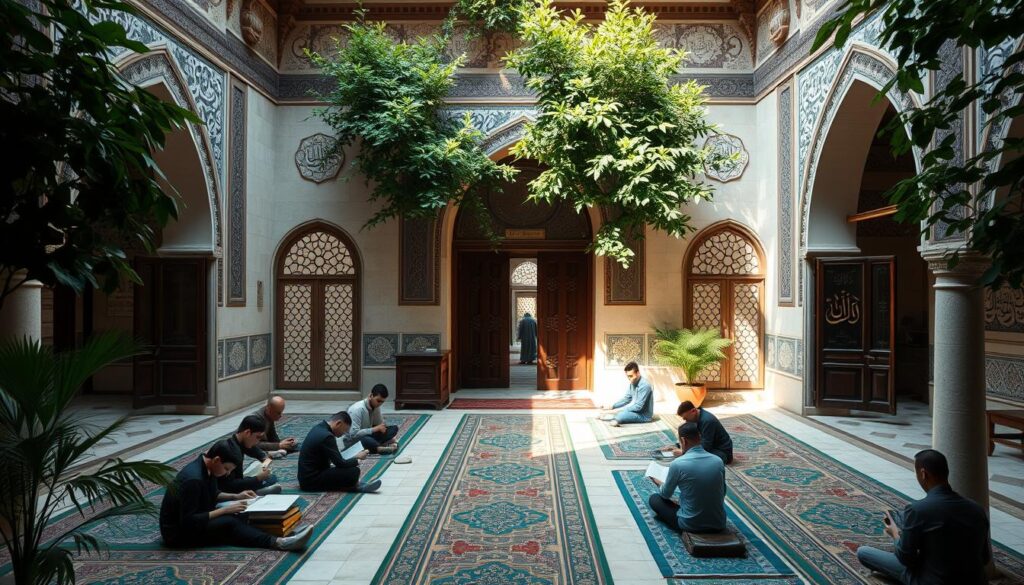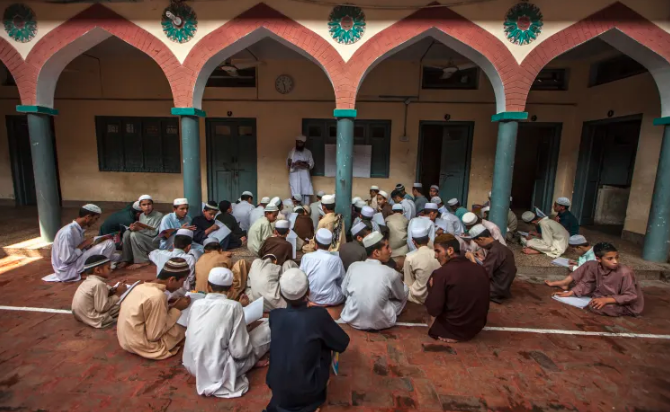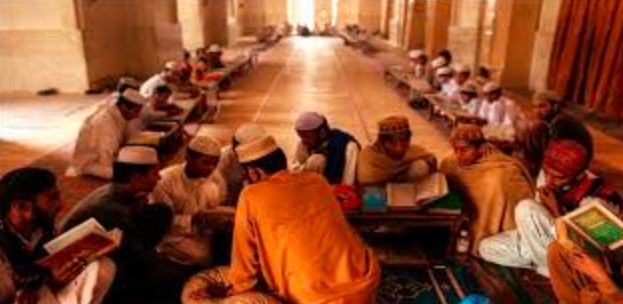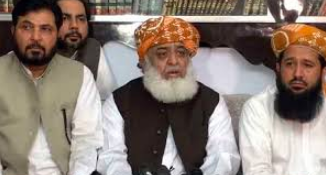Pakistan’s Religious Seminaries Bill aims to change the country’s Islamic education. But it has caused a big controversy, with the government and religious leaders at odds.

For years, Pakistan’s religious education has been a big issue. The country’s Islamic schools, or madrassas, are key in shaping its religious and political scene. Now, the government wants to control these schools more. This is challenging the country’s religious freedom and national identity.
Exploring this debate, I see a tough choice. It’s about updating education while keeping Islamic traditions alive. The outcome will greatly affect Pakistan’s future.
Keep Reading:
South Korea opposition parties submit new motion to indict President Yoon
Overview of Pakistan’s Religious Seminary System and Its Historical Context
Pakistan’s madrassas, or Islamic seminaries, have a long history. They have shaped the country’s education and faith. These schools have been key in teaching faith and community values to many Pakistanis.
The madrassa system started in the 11th century. Over time, they grew to meet the need for religious knowledge. During British rule, they were important in keeping Islamic teachings alive and fighting against the British.
After Pakistan gained independence in 1947, madrassas continued to grow. They became crucial in forming the nation’s faith and society. They offered free education and housing, especially to those who couldn’t afford it.
But, some madrassas have been linked to extremism. This has led the Pakistani government to think about changing the religious education system. They want to make it more controlled and responsible.

Why a Bill on Religious Seminaries is Pakistan’s Latest Flashpoint
A bill on religious seminaries in Pakistan has become a big issue. It shows the country’s deep sectarian tensions. The government wants to control these schools, called madrassas, better. But, religious parties and seminary leaders strongly oppose this.
There are worries about students becoming radicalized in these schools. The government says it needs to watch them more closely. It wants to make sure they teach well and help unite the country. But, others see this as a threat to their schools’ freedom and faith.
This fight has also become political. The Jamiat Ulema-e-Islam-Fazl (JUIF) party is leading the opposition. They believe the bill is trying to weaken their power and the role of religious schools in Pakistan.
The debate is also about sectarian tensions. Most madrassas are Sunni, but the government’s plans worry the Shia minority. Both sides are accusing each other of political and religious tricks.

The battle between the government and religious groups over the bill is critical. It could change Pakistan’s education, politics, and security. The outcome will affect the country’s social and political life greatly.
Key Provisions and Objectives of the Religious Seminaries Bill
The Religious Seminaries Bill in Pakistan aims to create a new rule for religious schools, called madrassas. It wants to tackle issues of madrassa rules and stopping extremism.
The bill requires madrassas to register with the government. This lets authorities check the schools’ curriculum, money sources, and activities. It also wants madrassas to use the same educational programs, mixing traditional Islamic studies with modern subjects.
The law also wants madrassas to be open about their money. They must show where their funds come from and have regular checks. This is to stop madrassa money from being used for extremist goals.
The government says this bill is key to updating religious education and reducing radicalism. But, some religious groups and seminary leaders oppose it. They see it as a threat to their freedom.
The Religious Seminaries Bill sparks a big debate. It’s about keeping religious education important while dealing with extremism. The government’s plans need to work with different groups to find a way forward.
Government’s Stance on Madrassa Reform and Security Concerns
The Pakistani government wants to reform madrassas because of terrorism and extremism worries. They say stricter rules for religious schools are needed to fight radical ideas. They believe the current lack of control in madrassas lets extremist views spread, threatening the country’s safety.
The government plans to make religious schools answer to them, with more checks and control over what’s taught. They hope this will make madrassa teachings more moderate and tolerant. But, they also want to protect religious freedom, finding a balance between security and the rights of religious schools.
Some people think the government just wants more control over religion, which could limit madrassa freedom. Religious parties and school leaders are upset, seeing the plan as a threat to their role in society.
Dealing with this issue is tricky for the government. They aim to keep the country safe while also keeping social and religious peace. The outcome will affect religious education and how the government tackles terrorism in Pakistan.
Opposition from Religious Parties and Seminary Leaders
The Religious Seminaries Bill in Pakistan has met strong opposition. Religious parties and seminary leaders say it threatens religious freedom. They believe the government wants to control religious education.
The Jamiat Ulema-e-Islam-Fazl (JUIF) is leading the fight against the bill. They plan to protest across the country. Seminary leaders also worry the bill could harm their role in teaching religion.
The debate over the bill is linked to Pakistan’s politics. Opponents say the government wants more power. The government says it aims to improve education and security.

The battle over the Religious Seminaries Bill shows the tension between religious freedom and modernizing education. Finding a way to please everyone is key to keeping peace in Pakistan.
International Pressure and Regional Security Implications
The proposed religious seminaries bill in Pakistan has caught the world’s eye. People worry about its effects on regional security and Pakistan’s fight against terrorism. Foreign governments and groups urge Pakistan to tighten rules on madrassas, pointing out links to extremist groups.
Pakistan’s government wants to update the madrassa system and watch it more closely. They aim to tackle terrorism and sectarian tensions. But, religious parties and seminary leaders see it as a threat to their freedom and teachings.
The debate touches on regional security. Neighbors like India fear madrassas could fuel cross-border militancy and radicalism. Pakistan’s efforts to curb extremism are key to South Asia’s stability.
Pakistan faces a tough challenge. It must meet international demands, address its citizens’ concerns, and protect national security. The outcome will shape Pakistan’s internal affairs and its global relations.
Balancing Religious Education with Modern Educational Standards
Pakistan is working hard to change its religious education system, known as the Islamic madrassas. It’s important to mix old religious teachings with new school standards. A new bill aims to do this, but it’s causing a lot of discussion.
The government wants to update religious schools because they’re not meeting today’s needs. Some schools teach outdated or extreme ideas. This worries people about national safety and the future of Pakistani youth.
The JUIF party has proposed a law to add science, math, and English to madrassa classes. This change aims to give students a balanced education for both faith and the world.
But, some religious groups and madrassa leaders are against these changes. They think it could weaken Islamic teachings. This disagreement is making the bill’s future very uncertain.
The government must talk to everyone involved to find a middle ground. This way, they can keep the heart of religious education while adding modern learning. Working together could lead to a big change that helps Pakistan’s young people grow in all areas.
Political Dynamics and Sectarian Tensions Surrounding the Bill
The bill on religious seminaries in Pakistan has sparked a complex political scene. It shows the country’s deep sectarian tensions and ideological splits. The JUIF party introduced the bill to oversee and regulate Pakistan’s many Islamic schools, or madrassas.
The JUIF, a big religious party in Pakistan, wants stricter control over these schools. They say it’s to stop radicalization and meet modern education standards. But, the government is slow to act, worried about the bill’s impact on power balances between the state and religious groups.
The bill also raises sectarian tensions, especially between Shia and Sunni Muslims in Pakistani politics. Sunni-majority JUIF’s efforts to reform madrassas face opposition from Shia-led parties and some Sunni groups. They see it as a threat to their religious freedom.
The core issue is how to balance religion in education and the state’s duty to keep the country safe and united. The government is careful, trying not to upset religious groups or make sectarian tensions worse. These tensions have long been a challenge in Pakistan’s politics.
Economic Implications and Funding Transparency Requirements
The new rules for religious schools in Pakistan are getting a lot of attention. They aim to make financial dealings clear, to stop misuse of funds. This is a big deal for the country’s religious education.
Some people worry that these rules could hurt the schools financially. Many schools depend on donations to keep going. They fear more rules could make it hard to get the money they need.
The government says it’s all about keeping things fair and stopping bad activities. But, religious leaders see it as a threat to their freedom. They think it could harm the traditional way of teaching in madrassas.
It’s a tough spot for the government. They want to make sure money is used right, but also keep the schools running. Finding a way to do this will be key to making the changes work.
Path Forward: Stakeholder Engagement and Compromise Solutions
The debate over Pakistan’s Religious Seminaries Bill is growing. A way forward must listen to all sides and move on education and security. The government wants to control religious schools more, but religious groups and leaders are against it. This shows we need to talk and find common ground.
The Pakistani government should talk a lot with religious experts, school leaders, and community members. Working together can lead to rules that respect religious freedom. At the same time, they must meet today’s education and security standards.
One possible way to solve this is to make seminary funding clear, introduce new courses slowly, and set up a watch group. This group would have both government and religious leaders. It could solve the government’s worries about extremism and money without hurting religious freedom.





